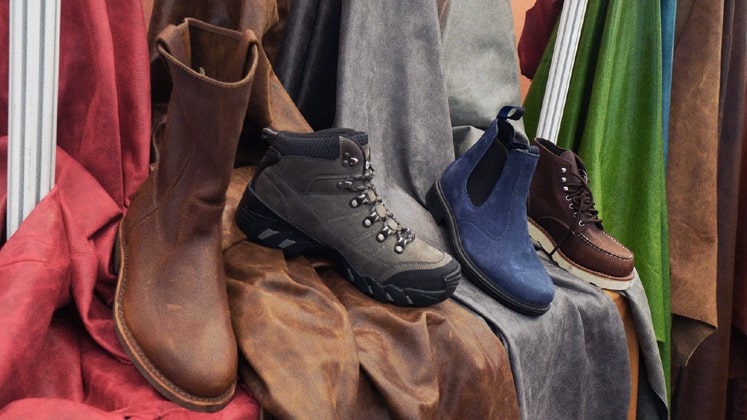
In what can be termed as a major setback for the leather industry in Bangladesh, the leather and leather goods sector lost its second position in terms of contributions to national exports, as earnings nosedived by 21.79 per cent to US $ 798 million in FY20.
As of FY19, the leather and leather goods sector was the second largest foreign currency earner after the readymade garments (RMG) industry with US $ 1.01 billion earnings, which came down to US $ 798 million, thereby pushing it to the third position as jute and jute goods took over as the second biggest export earner with earnings of US $ 882.35 million in FY20.
As a matter of fact, the jute sector has demonstrated positive growth throughout the last fiscal with earnings from exports of jute and jute goods increasing by 8.10 per cent to US $ 882.35 million in FY20, up from US $ 816.27 million in the previous fiscal. Now, with China deciding to offer tariff exemption on 97 per cent of Bangladeshi products, export of jute and jute products to China is expected to get a further fillip, as it is one of the major export items from Bangladesh to China.
It’s a different story altogether that the Bangladesh Government has recently announced plans to shut down production at all state-owned jute mills after making full payments to the workers. Ahmad Kaikaus, Principal Secretary to the Prime Minister, revealed this plan which will send about 25,000 workers at 26 jute mills into early retirement under a scheme, euphemistically called the ‘golden handshake’.
Contrary to jute, exports of leather and leather products have been severely impacted by slump in sales. Work orders for finished and crafted leather from four major markets of Spain, Italy, Hong Kong and South Korea, which when combined account for about 60 per cent of the total export of finished and crafted leather products from Bangladesh, dropped 40 per cent, according to reports. While on the other hand, even though work orders from China remained stable, prices were low, claimed industry insiders adding that around 30 per cent of the country’s yearly production of finished and crafted leather is exported to China. As a result, tanners are forced to sell their products to non-compliant Chinese companies at nearly 40 per cent below the regular price, as European and American buyers are currently uninterested in importing goods from Bangladesh.
Meanwhile, the Leather goods and Footwear Manufacturers & Exporters Association of Bangladesh (LFMEAB) has urged the Export Promotion Board (EPB) to withdraw source tax on export subsidy to help the industry recover amidst the coronavirus fallout.
“We urged the EPB to ensure equal rights for all export sectors by removing inconsistencies among the industries so that they can recoup the losses incurred due to this pandemic,” said LFMEAB President Mohammad Saiful Islam who went on to maintain that the Government gives preferential treatment to major export sectors such as garment, before adding that such an approach can be “considered as discrimination against the leather sector.”
“So, we want the same facilities granted to the garment sector. This includes tax breaks on exports, imports, VAT, bonded warehouses and so forth,” said Nasir Khan, Chairman and Managing Director, Jennys Shoes, a local pioneer in the manufacture and export of leather footwear. He added that it would not be a tough ask for the leather goods sector to expand its exports to US $ 10 billion by 2025 if the authorities, including the National Board of Revenue (NBR), EPB, port authority and banks cooperate with them.
Amidst these challenges, export of processed leather to China had been hindered due to supply chain disruption by the COVID-19 pandemic, he explained.
The CETP and relocation of industries, in particular, seem to be the major stumbling blocks to the industry towards improving export and production.
“While diversification of goods to reduce dependency on the single RMG sector is critical, a sharp decline in the second largest export earner is a bad sign for the country’s export earnings,” opined Zahid Hussain, former World Bank lead economist in Dhaka office, adding, “To gain buyers’ trust and to attract them, we must first ensure environmental compliance to survive. The Government should complete the CETP within the next few months, as the world business model would be changed and buyers would move to new destinations.”
Earlier, the BTA claimed that tanneries were suffering from a capital shortage following a drop in sales, subsequently to which the country’s rawhide business has been severely impacted. Stocks of leather remain unsold at many processing factories due to low demand among buyers and this spells trouble for the business, as most tanneries do not have enough working capital to purchase rawhide this year, said BTA President Md. Shaheen Ahmed.
Last year, traders were forced to dump thousands of pieces of rawhide after they were unable to get adequate prices for the product from seasonal traders at the field level. “However, the current situation may be even worse than last year, as the COVID-19 fallout has had an adverse impact on our business,” said Shaheen Ahmed, who along with other officials of BTA met with the officials of the Finance Ministry, Bangladesh Bank and state-owned banks to ask them to help address the industry’s financial crisis.
The BTA President also demanded waiver of the interest owed by tanners on previously availed bank loans. “We want a moratorium period for payments of our old loans as much of those turned classified over the years,” he said, while adding that most tanners have been unable to enjoy the benefits of the Government’s Taka 20,000 crore and Taka 30,000 crore stimulus packages due to the stringent conditions attached to the two.
Only 30 per cent of 155 tanneries at the newly established Savar Tannery Industrial Estate are currently operational due to a thin flow of work orders, industry people said.
Considering the current status of the leather sector, the country’s central bank, the Bangladesh Bank has come up with a new initiative as part of which rawhide traders can reschedule loans with 2 per cent down payment. The Bangladesh Bank has given a directive to the commercial banks to reschedule the loan of rawhide traders with only 2 per cent down payment on the eve of Eid-ul-Azha, the biggest supply season for rawhides.
The traders can apply for new loan with minimum 2 per cent down payment. The respective banks will decide to provide new loan to the rawhide traders on the basis of bank-client relationship. However, the banks cannot reschedule the loan of rawhide traders for less than 2 per cent down payment. Bangladesh Bank’s Banking Regulation and Policy Department issued the directive recently and letters in this direction were sent out to the MDs and CEOs of all banks.
The Bangladesh Bank’s instructions also said the loan instalment already collected will not be treated as down payment in this case. Its instructions also said the rescheduling facility can be provided under this circular if the loan or investment account has been classified and the business is in operation. On a case-to-case basis, the call loan and ongoing loan with a grace period of one year can be rescheduled for a maximum period of 6 years and the term loan for a maximum period of 8 years.
The condition of accepting a compromised amount can be relaxed in the case of disbursement of new loans for the purpose of purchasing rawhides of sacrificial animals, the directive said.
The interested rawhide traders have to apply for this loan by 30 July.
With a little more help from the Government and the stakeholders, one can hope that the leather and leather goods sector of the country can make a turnaround once again.






